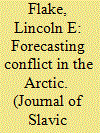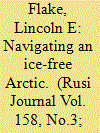| Srl | Item |
| 1 |
ID:
152220


|
|
|
|
|
| Summary/Abstract |
The West’s approach to Russian machinations in the Arctic is too often misinformed by simplistic media storylines of militarization and zero-sum competition. While Russian behavior of late in Ukraine and Syria has hardly been reassuring, Moscow’s Arctic approach stands remarkably separate from the larger tumult of relations with the West. The prevailing focus on security enhancements across Russia’s Arctic coastline risks oversimplifying Kremlin decision calculus and distorting conflict potential. Fortunately, recent trends in the region provide greater contextualization concerning Russian security. This article examines six features of Russia’s Arctic strategy that are particularly significant when considering an effective Western counter-posture in the Arctic. Three act to mitigate the risk of confrontation, while three other factors hold the potential to aggravate the security environment, After setting the geopolitical scene with these six features, this article offers five policy suggestions for the four NATO Arctic rim states. It argues against a blunt force deterrence posture in favor of a more nuanced approach based on issue-specific cooperation so as not to unnecessarily drag the region into a larger geopolitical fight.
|
|
|
|
|
|
|
|
|
|
|
|
|
|
|
|
| 2 |
ID:
137555


|
|
|
|
|
| Summary/Abstract |
The Arctic has reemerged as a region of geo-political consequence following rapid reduction in sea ice in the past decade. As the only non-NATO Arctic littoral state, Russia’s approaches to the many disputes in the region will undoubtedly have the greatest bearing on the future security environment. This article examines the two most threatening circumpolar disputes, sea bed delineation and navigation rights, and postulates that Russia’s policies on both issues conform to historical patterns. Recent Russian policy decisions are placed in historical context in order to gauge conflict potential in the Arctic related to these two disputes. The main finding is that the path-dependent trajectories of both issues are becoming ever more distinct as Russia articulates its Arctic policies. In particular, structural and historical factors encourage Moscow toward cooperation and compromise on sea bed negotiations but also suggest that Kremlin intransigence on navigation will continue, with potentially detrimental effect on regional stability.
|
|
|
|
|
|
|
|
|
|
|
|
|
|
|
|
| 3 |
ID:
122256


|
|
|
|
|
| Publication |
2013.
|
| Summary/Abstract |
Climate change is set to elevate the debate over maritime navigation and coastal state jurisdiction in the Arctic Ocean. Russia, with its centuries-old claim over the Northern Sea Route, is likely to increasingly clash with proponents of navigational freedoms as receding ice makes Arctic seaborne logistics viable. Moving forward, Moscow's Arctic posture may resemble its Near Abroad intransigence, particularly when dealing with foreign navies operating in Russia's self-proclaimed area of control. Lincoln E Flake reflects on how the issue of freedom of navigation could pose a greater risk to Arctic stability than the better known disputes over seabed claims and competition for hydrocarbon resources.
|
|
|
|
|
|
|
|
|
|
|
|
|
|
|
|
| 4 |
ID:
126111


|
|
|
|
|
| Publication |
2013.
|
| Summary/Abstract |
The Arctic is beginning to test the stage-managed optics of China and Russia's 'strategic partnership'. Friction was most recently on display after the Arctic Council's May 2013 decision to confer permanent observer status on Beijing. The Chinese media celebrated the move as an affirmation of the nation's 'legitimate rights' in Arctic affairs.1 Russian officials were much less enthusiastic. Following the decision, Russian Prime Minister Dmitry Medvedev quickly reminded China that 'Arctic states lay down the rules here'.2 In fact, Russia was the primary force in obstructing China's observer status application for nearly seven years. It was only after considerable pressure from Nordic nations and a 2011 change, which required new observers to 'recognize Arctic states' sovereignty, sovereign rights and jurisdiction in the Arctic', that Moscow reluctantly approved the move.3 Interestingly, Russia is ostensibly China's strongest partner in the eight-member Arctic Council. The observer status episode revealed a rare fracture in a relationship which both sides have taken great care to cultivate as trouble-free. Indeed, recent Sino-Russian policy synchronisation on Syria and Iran, among other issues, has led Richard Weitz to assert that bilateral relations between Russia and China are at an all time high.4 However, Arctic climate change presents a challenge for these bilateral relations. Long-suppressed disagreements concerning access to sea lanes, fisheries and energy resources are quickly gaining practical application as sea ice cover diminishes. This article examines Sino-Russian interaction in the Arctic and concludes that, notwithstanding present differences, several factors suggest that cooperation will prevail.
|
|
|
|
|
|
|
|
|
|
|
|
|
|
|
|